|
|
|
Sort Order |
|
|
|
Items / Page
|
|
|
|
|
|
|
| Srl | Item |
| 1 |
ID:
074369
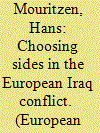

|
|
|
|
|
| Publication |
2006.
|
| Summary/Abstract |
Focusing on the Euro-Atlantic conflict over the Iraq war operation in early 2003 (the 'European Iraq conflict'), the purpose of the present article is to explain the pattern of Atlantic (vs. Continental) predispositions among European countries. It argues that this is the best suited conflict in the post-Cold War era to illuminate this stable and fundamental pattern. Whereas systemic power distribution, size, public opinion, or government ideology all fail to account for the positioning of states in the conflict (and balance of threat applies only modestly), a theory of 'past and present geopolitics' is outlined that seems able to explain states' predispositions and, hence, their positionings in this specific situation. It is remarkable that 'old-fashioned' geopolitical dynamics can be identified even within the Euro-Atlantic zone of 'peace and prosperity'-not only at its fringes, but also in its very heart.
|
|
|
|
|
|
|
|
|
|
|
|
|
|
|
|
| 2 |
ID:
065052
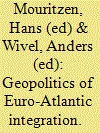

|
|
|
|
|
| Publication |
London, Routledge, 2005.
|
| Description |
xiii, 269p.
|
| Series |
Europe and the nation state
|
| Standard Number |
0415282802
|
|
|
|
|
|
|
|
|
|
|
|
Copies: C:1/I:0,R:0,Q:0
Circulation
| Accession# | Call# | Current Location | Status | Policy | Location |
| 049974 | 341.2422/MOU 049974 | Main | On Shelf | General | |
|
|
|
|
| 3 |
ID:
124527
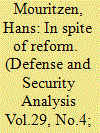

|
|
|
|
|
| Publication |
2013.
|
| Summary/Abstract |
Security Intergovernmental Organizations, here illustrated by NATO, persist in a "permitted interval" of internationalization, i.e. permitted by its member-states. On the one hand, they are seldom or never permitted to vanish due to member-states' vested interests in retaining them as tools of statecraft, even if their original purposes have become redundant. On the other hand, there is an internationalization ceiling that they must respect: they should not become too autonomous and thereby no longer be suitable as member-state tools. In spite of post-Cold War reform, interviews carried out at NATO Headquarters (HQ) in the late 1980s compared to interviews in 2012 display that a continuous pulling and hauling of forces of internationalization and renationalization have taken place around NATO HQ. The only instance of clear internationalization can be observed in the proactive diplomacy of Secretary General Fogh Rasmussen. There is stiff opposition to the internationalization of abolishing the Military Committee/International Military Staff among minor and South European states, and there is no waning in states' attempts to micro-manage the International Staff. Only external shocks can overcome resistance to internationalizing reform.
|
|
|
|
|
|
|
|
|
|
|
|
|
|
|
|
| 4 |
ID:
101472
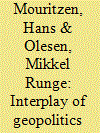

|
|
|
|
|
| Publication |
2010.
|
| Summary/Abstract |
Realist theory can no longer afford to neglect cases where policy-makers' 'lessons of the past' play a role in foreign policy decisions. The case of Denmark confronting the prospect of German post-war rearmament should illustrate an interplay between the state's geopolitical necessity - acquiescence in German NATO membership and rearmament due to Soviet military proximity - and policy-makers' lessons from the recent German occupation of Denmark (that led to Danish inclinations to reject such membership). In other words, this is a case of strong and countervailing pressures. The article examines how the interplay unfolded, including the tactics politicians used to counterbalance and overrule any 'inconvenient' lessons. Whereas geopolitical pressures clearly dominated the 'competition', one historical lesson could be used as a negotiation asset to bluff foreign powers on the related Schleswig issue. The general thesis articulated in this article is that the state's external freedom of action, as a gate-keeper, may allow or forbid lessons to play a role. Studying only situations characterized by wide freedom of action gives us a biased picture of foreign policy, implying that policy-makers are free to enact whatever peculiarities or constructions - in the case of this article, historical lessons - are available to them. However, such situations remain only special cases of foreign policy.
|
|
|
|
|
|
|
|
|
|
|
|
|
|
|
|
| 5 |
ID:
149493
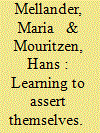

|
|
|
|
|
| Summary/Abstract |
By measuring foreign policy assertion, we document that Danish and Swedish Russia policies have fluctuated widely in the 21st century, as well as in relation to each other. Specifically, big assertion leaps took place in 2002 (Denmark) and 2008 (Sweden). Having conceptualised and operationalised small state assertion, we proceed to the explanation of these leaps. The same factor turns out to be the efficient explanation in both cases: an individual policy-maker’s so-called ‘lesson of the past’ – what he believes ‘history teaches us’. It is shown how existing theory of lessons of the past can contribute to the understanding of small state assertion in asymmetrical dyads, but only if the proper permissive circumstances are identified. First and foremost these amount to the presence of a reasonable foreign policy action space.
|
|
|
|
|
|
|
|
|
|
|
|
|
|
|
|
| 6 |
ID:
074083
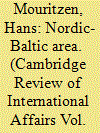

|
|
|
|
|
| Publication |
2006.
|
| Summary/Abstract |
States in the Nordic-Baltic area reacted heterogeneously to the Iraq War operation: Denmark chose to participate; Iceland, Estonia, Latvia and Lithuania supported the operation diplomatically or materially; whereas Norway, Finland and Sweden were negative. The research tool used to explain this pattern is the parsimonious theory of 'past and present geopolitics', taking issue with systemic neorealism, primarily. In spite of official rhetoric emphasizing Baghdad or New York (the UN), states' driving forces were mainly found in their different salient environments. The primary explanation, proximate power balancing, was at work regarding Denmark, Estonia, Latvia and Lithuania. Iceland, with no big neighbour, could enjoy profit bandwagoning, while Sweden and Finland followed 'standard operating procedures'. A minor aberration from expectations is noted regarding Finland: its EU balancing rather than US balancing of Russia. The Norwegian 'no' and Danish warfare were both an expression of geopolitical freedom of manoeuvre.
|
|
|
|
|
|
|
|
|
|
|
|
|
|
|
|
| 7 |
ID:
151609
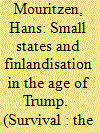

|
|
|
|
|
| Summary/Abstract |
In a multipolar world with weak institutions, and where the alternative can be chaos and war, Finlandisation is better than its reputation.
|
|
|
|
|
|
|
|
|
|
|
|
|
|
|
|
| 8 |
ID:
000904
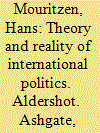

|
|
|
|
|
| Publication |
Aldershot, Ashgate, 1998.
|
| Description |
xx,170p.
|
| Standard Number |
185521993X
|
|
|
|
|
|
|
|
|
|
|
|
Copies: C:1/I:0,R:0,Q:0
Circulation
| Accession# | Call# | Current Location | Status | Policy | Location |
| 040383 | 327.101/MOU 040383 | Main | On Shelf | General | |
|
|
|
|
|
|
|
|
|